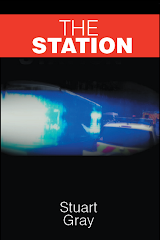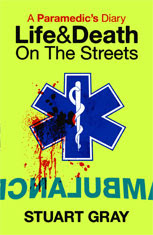
Pancreatitis. Not a funny condition at all. Very, very painful. If you suffer with it, you have my sympathy.
I attended four pancreatitis-related calls during my last run of shifts and one of them was particularly severe. The gentleman was in extreme pain. The sort of pain you know at-a-glance is not being put on, faked or exaggerated in any way, shape or form. He was as white as a sheet and sweating for England. He couldn't move without screaming out in agony.
I gave him morphine and he needed 10mg before he settled down. It took three attempts for me to get a cannula in him though. The first attempt was a rubbish vein (which I could have assessed better before attempting it), the second came out when he jumped up in a spasm of pain but the third stayed where it was needed and gave me access to his bloodstream for analgesia. I also had a clinical decision to make. There was no ambulance available just yet and I had to make the best of his stability whilst the morphine had an effect. So, while he was able to walk I took him to the car and sped to hospital with him. It took me 7 minutes. I may have waited up to 20 minutes otherwise. This was a green2, so low down on the priority for a vehicle.
I'm not going to whine about the system, it's pointless. Instead, I'm going to exercise my professional ability to make clinical decisions about conveying patients. I'll call it in - I always do - but if it's a choice between a patient waiting in pain and one that gets to definitive care quickly, then I will do it, provided there is no obvious risk to the patient. That's my job, isn't it?
I was asked to go and assess an elderly leukaemia patient who wasn't feeling well. She had an appointment at the hospital for treatment but didn't make it as far as the bus stop. I went to her home, where she had been waiting with a worried neighbour for 40 minutes (green2), and carried out a thorough assessment (I really need to consider doing my ECP training. I might as well). She wasn't well at all. Very low BP, pale, sweaty. Shocky. I contacted Control and asked that the call be upgraded because we had all been sitting in her little hallway for almost an hour now and I had run out of things I could actually do to help her. Even conversation tends to become stinted when there is nothing left of relevance to say. I could hardly discuss the telly with her in the state she was in.
The crew arrived and removed her to hospital as quickly as I would have done myself. Obviously, there was no way I was moving this lady by car - even though I was tempted. She couldn't walk and just didn't look like she was going to survive an upright journey.
I have touched on this clinical decision making subject before, I know, but I truly believe that it is why we are trained to think in the first place. Surely we are skilled enough to see the obvious and deal with it appropriately? None of it is about being better or best. It's all about the patient.
You may have noticed that I am now using links where relevant. I hope you don't mind this and find it useful. It saves me rambling away from my main point in order to explain something in greater detail. It's also a good educational tool if you need it!
I went to Kiev a few weeks ago (I know, I didn't tell you) - I was incognito. I spent a few days there discovering the old Soviet fingerprint of structure and architecture (which is pretty amazing) from the bad old days of the Cold War. I also went to learn some Russian and educate myself. I didn't know that there was a Russian language and a Ukranian language. You see, I learned tons. Anyway, I saw the ambulance pictured and thought you might be interested in seeing it.
I might publish a few more of the photo's I took (they won't be relevant to any entry but they will be pretty to look at!). You don't mind, do you?
будьте безопасны















11 comments:
Hiya,
I find the links really good, it does help people like myself that dont have any medical background, And as for putting pictures in your entrys, go for it, i want to see them.
Another good entry as always.
Take care
Lynn xxxx
Xf,
большое спасибо,
[Noise of short person clambering onto soap box] Clinical decision making is something I am particularly interested in as I believe that execution of accountability and autonomy is crucial to what we do as healthcare professionals (HCP). Yet conversely, it is probably one of the hardest things to teach or inculcate in an aspiring professional.
You make a good case for your risk taking behaviours based on clinical data, awareness of limiting factors and a dose common-sense/pragmatism. The last is probably the hardest to come by as no model I have ever seen has managed to incorporate an effective algorithm for this.
However, I would argue it is wrong to presume all HCP's are skilled in, or even capable of, higher level critical thinking. Some registered HCP's may go through their entire career and never achieve a standard equating to true professionalism as adherence to rigid policies, procedures and protocols can result in a diminution of critical thinking and decision making. Failure to act professionally can be seen in FAI, inquest, professional conduct or ombudsman reports where allegedly intelligent HCP's have totally bypassed the blindingly obvious and gone straight for decisions which ignore the patient and would defy even chaos theory!
[can I come off my soap box now... and has anyone got some ladders???]
Lucy
more pictures would be appreciated.
Lucy
You speak Russian too? Here's some ladders for you...
You are right but I guess that debate extends to ALL professionals involved in the criticial decision-making process and whose jobs are guided and influenced by protocols and algorithms.
My decision to give diazepam to a patient I discussed in an earlier entry as probably suffering an acute dystonic reaction was heavily criticised by a few of my colleagues, none of whom would dare take the risk. The fact that the patient was called in as epileptic and that he is normally given diazepam by his doctor and had run out...or that the drug worked and helped him, completely passed them by. They didn't even bother to ask me for any other influencing circumstances and I was subsequently accused of behaving almost negligently - not by my peers, by my equals.
Interestingly it sparked a debate in which other, like-minded paramedics argued that if we don't allow ourselves to use our skills and knowledge we will forever be thought of us trolley bearers and nothing else.
These days, I act on my own initiative more than ever.
Many thanks to you too :-)
Dobrogo dnya,
You didn't mention the most amazing thing about Kiev: the fact that a journey on their equivalent of the Tube costs about 7p. It's not as if it's inefficient or particularly run-down either. I often ask myself how can they run an underground train system charging 7p a trip when ours doesn't earn enough money to maintain itself charging £4.00 for each journey!
Do pobachennya!
Thanks for the ladders. I studied Russian for a while but sadly most of it has gone now and I only have odd phrases. The most useful I've retained is that "I dont speak Russian very well" which, according to a Russian medic I was practicing it on I speak with a decent accent. Which is rather sad as that was the extent of my conversational ability!
Power to your elbow in learning it, especially the handwritten style which was really my undoing as most of the letters to my eye came down to an m or w which was большое confusing.
Your point about use of professional judgement is crucial in the light of the emerging 'new' roles and expanded scope many are taking on. There is a rather thought provoking 2002 article by an educationalist on professional values versus prescriptive operating practices. I will warn you that its focus advocates the Scottish approach to professions over the English style but if you can get over the sabre rattling at the border it makes some very pertinent points about what it is to be a professional and how society reacts to this. If you get a chance to read it I'd be interested to hear your views, and anyone else's, who feels like commenting. It is available at http://www.creativecommunities.org.uk/pdf/1.5ProfessionsMcGettrick.pdf
Sorry for the length of the posting and rather hijacking the comments box but I do feel strongly that the attitudes and values we demonstrate today will be core to how each of our respective professions develops in the future.
Lucy
*gasp* what's that apostrophe doing in the last paragraph?
What apostrophe? :-)
Duly removed...I'd better be careful with this Russian lark - I'm not sure what I'm saying sometimes!
Thanks for pointing it out...
Zebedeezbd
I didn't get a look at the subway system. I wandered around the mile or so radius encompassing my hotel in Independence Square, so everything I wanted to see was pretty much on my doorstep.
However, I did go into a designer shop and noted that they were having a sale in which a jumper could be had for the equivalent of 5p. I didn't buy it. I didn't like the colour, or the style. Or the material.
Lucy
Thanks for your comment. I want to see debate on this blog, so feel free to hijack.
I will read this article (speech) in more depth later but I have had a quick scan and, apart from the obvious continual Anglo-Scottish distinctions, it seems to underline today's professionalism quandary.
I will be writing about this more myself in the future as I come across my own ethical and moral dilemmas.
Xf,
Thanks, will look forward to more postings on the ethical dilemmas you encounter and keep my soap box in readiness.
Re: our 'substantial' pay rise this year, living somewhere with 5p designer jumpers and a 7p subway is starting to sound rather tempting. Now where did I put my phrase books....
Lucy
Post a Comment